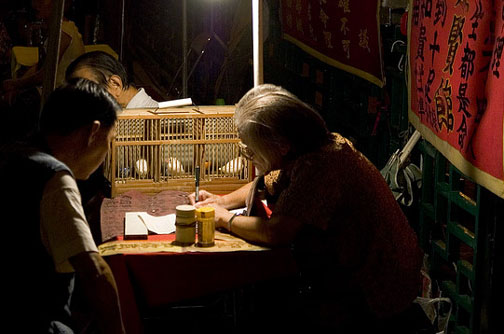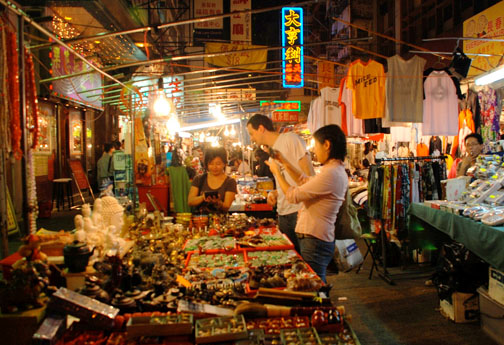There are two things I enjoy most while travelling in foreign lands: soaking up local color and shopping. And there’s no place better to do both than a street market in Asia. Finding street markets not heavily trafficked by touri is ideal. Following the advice of guide books usually means higher prices and far too many white faces. But sometimes good street markets are listed in the guide books and you can not avoid going with the touri flow. A good example is my favorite market in Hong Kong; the Temple Street Night Market, replete with food stalls, pirated CD’s and DVD’s, knock-offs of every major clothing design house, and electronics of ever imaginable sort.
More than just a market, Temple Street has a unique atmosphere that makes it a must-do for Hong Kong visitors. Fortune tellers huddle by gas-lit lamps next to local chess masters. Street singers perform Cantonese opera. Tables and chairs from stalls selling local delicacies overflow into this street that was named after a nearby temple honoring the goddess Tin Hau. And great bargains abound.
At night, the street becomes a fairyland of consumerism. Some stalls are humble, no more than a piece of cardboard on the ground, protecting a pile of beads from the sweating concrete. Some are elaborate, piled high with gleaming electronics. And the Yau Ma Tei end of the street features an echelon of palmists, physiognomists, and a fortune-teller whose trained birds select slips of paper to predict the future, your destiny by avian prestidigitation.
Officially the Temple Street Market is open from 2 pm, but it really gets going after dark. I kind of get the impression that post 9 pm is best. The market extends for half a dozen blocks, you need to pay attention to avoid getting run over in the cross streets. Or hang for a bit and watch some other unsuspecting touri get hit. It’s usually quite busy, bustling even, until quite late. The latest I’ve been there was around 11:30 pm, stalls and nearby shops were just starting to pack up for the night.
Of course, as at all street markets in Asia, bartering is a must. At least if you don’t want to overpay for the cheap goods you buy. Which brings us to this tale and brings my friend Ann back into the journey. Ann, her friend Char, and I had been in Bangkok and decided to take a few days out to see the sights of Hong Kong. Now Ann, on her first trip to Thailand, had really gotten into bartering at the street markets of Bangkok. It’s good fun and everyone, both seller and customer alike, are out for enjoyment (besides making a buck or getting something for a song). Typically, in Bangkok, the asking price is way over inflated, you offer a ridiculously low price in return, the merchant tells you about her sick grandma, you plead poverty . . . and it goes back and forth until a bargain is struck. Everyone is happy and everyone has a good time in negotiating the deal.
Not so in Hong Kong. As Ann discovered. We visited Temple Street to see the sights, and for Ann to purchase a calculator (great tool for shopping in a place where English may not be spoken . . . like Hong Kong . . . for once being a British Colony it’s down right amazing how many of the natives don’t speak English). A new friend we made in Bangkok, typical of a Thai, borrowed hers and never returned it. After visiting several stalls and trying them out, she found the calculator of her dreams. “How much?” she asked the vendor.
“100 HK Dollars!” was his curt reply. (Hong Kong Chinese don’t hold Americans in high regard to begin with, and a woman??? Ha!)
Ann smiled and quickly came back with her Bangkok based offer, “10 HK Dollars!”
Yikes!
“Fuck You!, Fuck YOU!” he shouted, face contorted in rage.
The look on Ann’s face was priceless (mmmmm, may be a MasterCard ad in there). She backed quickly away from the stall, totally bewildered. He’d offered her the calculator at about US$12.00. She’d countered at a price slightly over a buck. It probably would have sold for about 80 HK dollars, or ten dollars U.S. In Bangkok, this would have been a fine beginning exchange. In Hong Kong, however, they have a bit more reverence for money. She would have known this if she’d checked her Frommers. Maybe those guide books have a use after all!



I love your writings.
Thank you!
There is only one thing better than shopping in Hong Kong, and that’s eating. From small noodle joints to upscale French restaurant, you will locate all sorts of restaurant, eating hall and snack stall on earth in Hong Kong. Here I found small amount of Hong-Kong-styled snacks online. This is definitely a good choice before I have $ for another trip.